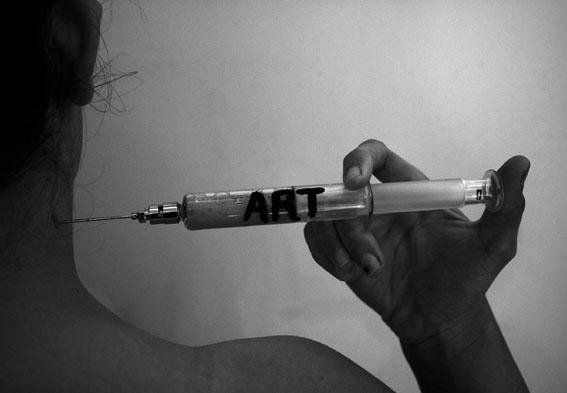roots - Young Art of India
dal 21/1/2010 al 12/3/2010
Segnalato da
Nekshan Dabu
Arun Peje
Rupali Angre
Shruti Mahajan
Ritesh Meshram
Bidyut Singha
Sandra Khare
21/1/2010
roots - Young Art of India
White Square Gallery, Berlin
Six artists explore their own 'stem cells' on a search for their origin. All of them focus on a specific period of their existence. These gradual differences in concepts of time are expressed on canvas as well as on a paper. It will be visible in the photographs of Nekshan Dabu and the brusque charcoal drawings of Arun Peje, in the dreamlike minimalistic landscapes of Rupali Angre and the drawings by Shruti Mahajan, in the museum of found objects by Ritesh Meshram as well as in the humoristic social critical drawings by Bidyut Singha.

Rupali Angre
Nekshan Dabu
Shruti Mahajan
Ritesh Meshram
Arun Peje
Bidyut Singha
Curated by Sandra Khare (Mumbai)
With the group exhibition roots the White Square Gallery takes on new challenges by
cooperating with international guest curators. The Indian curator Sandra Khare (*1976,
Mumbai) is the first in line to exhibit Indian art that focuses on memories and their visual
depiction. From the 22nd of January until the 13th of March 2010 she will be presenting the
work of six young artists from several different Indian regions in the White Square Gallery in
Berlin. The exhibition was especially arranged for the Berlin venue.
The curator Sandra Khare explains her approach: "Six artists explore their own "stem cells"
on a search for their origin. All of them focus on a specific period of their existence. The
Artists present their work like a process, without a clear limitation of time. These gradual
differences in concepts of time are expressed on canvas as well as on a paper. It will be
visible in the photographs of Nekshan Dabu and the brusque charcoal drawings of Arun
Peje, in the dreamlike minimalistic landscapes of Rupali Angre and the drawings by Shruti
Mahajan, in the museum of found objects by Ritesh Meshram as well as in the humoristic
social critical drawings by Bidyut Singha."
All six artists have already participated in group exhibitions in India. The White Square
Gallery now enables them to show their work internationally.
From the 16th of March till the 15th of April the Indian Embassy will take over the exhibition.
The works of Rupali Angre (*1976) are mystical and dreamy. Empty chairs and beds, tipped
over vases, and stalled cars are the favourite motives of her installations. Several floral
patterns enliven the rooms and wrap around the few featured objects. The lyrical accents
emphasize a very fragile notion throughout Rupalis work, always irradiating the reluctant
beauty of loneliness.
The photography’s taken by Nekshan Dabu (*1979) are visual interpretations of different
questions regarding her own artistic existence. In this exhibition the video artist presents
three of her photographic works, in which she deals with her reactions to influences and
dependencies on art. Art is shown as an exogenous substance, which will become part of
oneself through i.e. an injection, and therefore leads to an influence from the outside world.
The artist is not trying to portray the general state of the artistic existence but is rather
interested in the depiction of her own situation.
The mysteriousness of the home, the silence of the house, the secret lives of the inanimate
objects in it, and the examination of the own body and his functions are the most important
motives in the works of Shruti Mahajan (*1977). In her affectionate and fragile drawings the
daily objects that are still very important in the daily life of women in many parts of India
come to the surface. The simple and mundane make one recall distant memories. Overlaying
forms and lines as well as imperfection are developed into a perishable snapshot of life.
The materials with which Ritesh Meshram (*1975) chooses to work, have for many years
been more important to him than his composition themselves. His obsession, to connect and
combine the most diverse and contrary materials with each other, has enabled him to
produce radical visual experiences time and time again. He works with found objects, books
purchased on the roads, and industrial substances. His sculptures look like unknown
machines that are willing to bite, whistle or sing. Ritesh Meshram also presents charcoal and
acryl paintings on aluminium in Berlin.
The charcoal drawings by Arun Peje (*1981) mirror his daily associations with "the city" and
its continuous changes. While some of his pieces endear the city of Mumbai, others simply
visualise India’s general urbanisation. His works are an image of a burdensome, yet hopeful,
city.
The personal right of every human being to exist, to act in his community, to be equal to
others is the central theme in the art of Bidyut Singha (*1975). In a humorous way he
exposes the indications of the never changing, inflexible and fixed ways of society. In the two
presented art works in Berlin Bidyut adapts the "story boarding" process known from film
productions. His serial figures, that are supposed to come to the expected end of their
actions, are full of mock and contempt for the absurdity of social norms and their influence
on nature and people.
In cooperation with Wegweiser GmbH Berlin
and with friendly support of the Embassy of Republic of India
Image: Nekshan Daboo., I am an artist and this is art, photography, 2009
Press contact: artpress – Ute Weingarten, Elisabethkirchstraße 15, 10115 Berlin
Phone: +49 30 21961843, E-Mail: artpress@uteweingarten.de
Opening Reception: January 22nd, 7pm
White Square Gallery / WSG GmbH
Mauerstrasse 83/84, 10117 Berlin
Tuesday – Saturday 12pm – 6pm
Sunday - Monday – closed or call us for appointment



